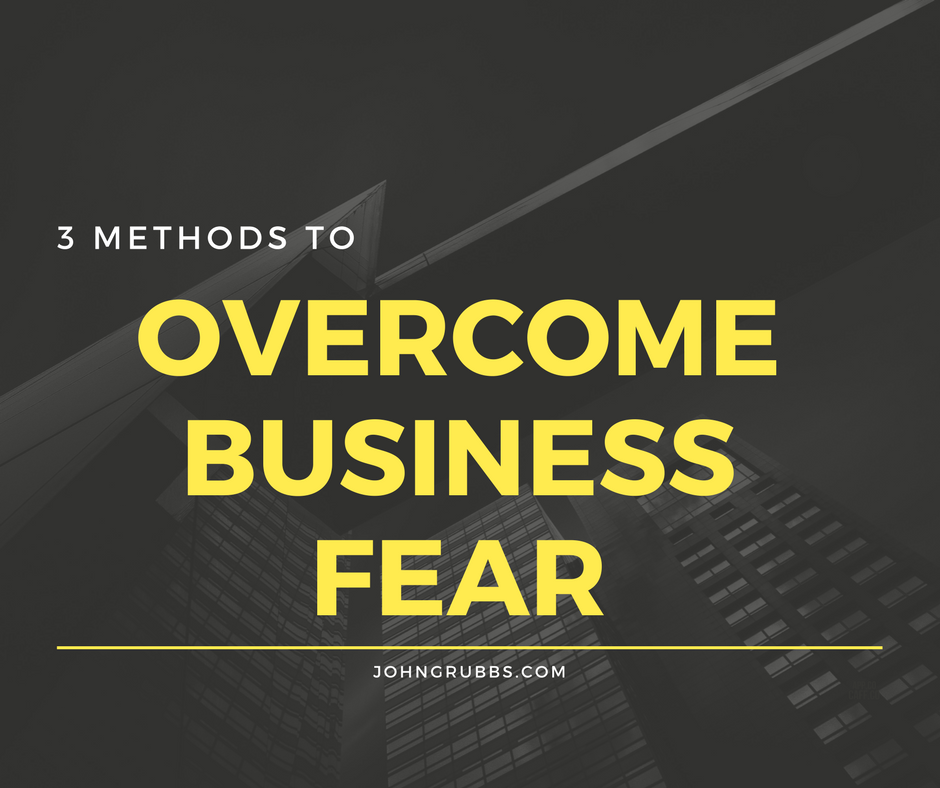|

Afraid to Try or Afraid to Stop? 3 Methods to Overcome Business Fear
Fear in business is the dirty little secret that nobody wants to admit exists. What drives this fear? How does it impact the bottom line? Most importantly, how do we overcome this fear? The following short story illustrates the root of fear and bias in the workplace. Any similarities with actual people or events are completely coincidental. Let’s go fishing with Phil and Larry.
The television commercial ends and Phil makes up his mind. He is going to buy the V64 Mega bass lure. He has seen amazing reviews online and even read great things in the magazines at his doctor’s office. At $59, it will no doubt be the most expensive lure he has ever purchased. He goes into his office, finds the website, enters his credit card information, and nervously clicks buy. He immediately thinks about what his wife will say
when she sees the credit card bill. “It’s worth it”, he reassures himself. It is done. A few days later, the package arrives and he cannot wait to open the shiny metal box that contains his magic lure. On Saturday, Phil is fishing with Larry on shallow, murky Lake Cantoo. He hasn’t told Larry about the V64 Mega and plans to surprise him on the lake. Larry has heard of the lure and they both have talked about the hype associated with this new fishing gadget. Phil reaches into his tackle box while Larry is distracted fighting a small black bass, and
pauses. He thinks about the many underwater formations and the trees that have been dropped in the lake during previous years. He doesn’t want to snag the bait and possibly lose it on this lake so he changes his mind. He will save it for the dark and deep Lake Marion next week. The following Saturday on Lake Marion, Phil surprises Larry with the lure and they both admire it before his first cast. Larry teases him about his fishing knot and the possibility of losing the lure in the water after spending so much money. Phil is nervous but will never admit it to Larry. Cast after cast, nothing hits theV64 Mega. Morning turns to afternoon and not one strike on the magic lure occurs. After lunch, Larry has caught a few nice keepers and
several smaller fish, but Phil is yet to catch a single fish. By midafternoon, Larry tentatively suggests that Phil switch to the type of lure he is using. Phil ignores him, convinced that the magic lure is still yet to perform wonders below the surface. At the end of the day, Phil is obviously frustrated so Larry encourages him that he will have better luck next time. Because of the high investment in the lure, Phil has overvalued its potential for success. Now that he owns the lure, he is certain it will be successful. This is the endowment effect. Simply owning something gives it more value in our minds. On Lake Cantoo, Phil was afraid to lose the valuable lure so he did not use it. On Lake Marion, he was afraid to stop using the lure that obviously wasn’t effective on that lake, during those
conditions with those fish. On Lake Cantoo, Phil was experiencing loss aversion. In his book Misbehaving, Nobel Prize winning behavioral economist, Richard Thaler states “we fear loss twice as much as the pleasure of gaining”. We will come back to this.
On Lake Marion, Phil was experiencing status quo bias. Status quo bias occurs when we prefer things to stay the same by doing nothing or by sticking with a decision made previously (Samuelson, & Zeckhauser, 1988). Why is this important? Consider a CEO that invests heavily in a project or capital equipment that he has pitched to his board and gained approval. If circumstances change or the project falters, how long does it take the CEO to change course? If the
investment is substantial, the CEO is likely to experience loss aversion and refuse to admit that the money has become sunk cost. Sunk cost are dollars invested that will no longer be as valuable as once estimated. This results in organizations continuing to spend money, time, and effort on projects that will never likely become successful. That is correct; Phil continued to use the V64 Mega lure because he spent so much time and money hoping for
success. Loss aversion can be equally as problem some for CEOs. If the loss (risk) is feared twice as much as potential pleasure (gain), what projects will a CEO be likely to approve or reject? Think about it this way, if loss is feared by a 2:1 margin over gain, the likelihood of saying yes to something with a reasonable amount of risk starts far below average risk due to fear. What can executives do to overcome the inherent fear and bias that exists in all
ofus?
- Acknowledge and own the propensity for fear. Know that when considering any project or corporate initiative, we are biased to avoid loss a higher rate than the potential for gain. Continually ask, “What is the worst that can happen and if it does, what will we do?” Opening the door to change course or stop early can make doing so much easier later.
- Assign team members to monitor and surface latent fear and bias. In other words, give someone on the team the role to say “stop, let’s reconsider this now”. Identify project points for honest reconsideration in the beginning. Reconsideration is an important and often avoided stage in any business project or initiative. A steel mill spent millions of dollars to install “new technology” slitting equipment that sat idle for years
due to fear of admitting failure.
- Teach and refresh leaders on the concepts of loss aversion, status quo bias, and sunk cost regularly. Being will to stop a project with momentum is extremely difficult. Helping them understand and apply techniques can save companies millions of dollars annually. This knowledge should not be limited to the CEO and her team. Board members must also understand that circumstances change and make the investment no longer effective. Sunk cost must be
acknowledged as part of the risk associated with doing business. We must be willing to change lures if the V64 Mega isn’t attracting fish.
Corporations spend billions of dollars out of fear and miss tremendous opportunity for the same reason.
Read More...

Leading the Tribes Video
Leading the Tribes Training - Book my 1-day class at your location for managers and supervisors.
Leading the Tribes Keynote Speech - Book my 1-hour speech for your event.
Call (903) 295-7400 Today!
-------------------------------
Keeping Top Talent Video

-----------------------------

Need a Keynote Speaker?

I'm always amazed at how fun you can make learning!
Tessa Conrad, Pak-Sher
Your excitement and energy as a speaker is amazing. Hearing you speak on your years of experience and insights on leadership and generational change was very relevant and something that we can all learn from and apply to our organizations.
Cliff McDaniel, Louisiana CPA Oil and Gas Conference
It was the best presentation that I have attended so far, You are the best speaker ever . I am so impressed that I have ordered 2 of your books on Amazon. So thank you for making a difference in people’s personal and professional lives.
Lovely Chandla, Hilton
John Grubbs' keynote message is powerful! John is able to clearly convey his knowledge and foresight on the generational changes that affect ALL of us. I had many A-ha moments with his vivid examples. We continue to talk about what his message taught us to this day. You will have to reach for a tissue to wipe tears of emotion and laughter. John's message is memorable and inspirational!
Maria Gallegos, Texas Chemical Council
Call John Grubbs (903) 295-7400


|






